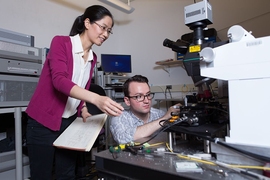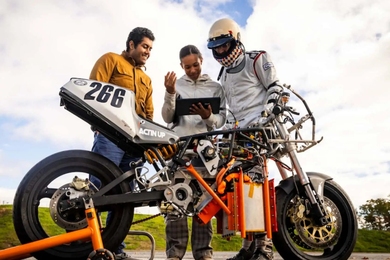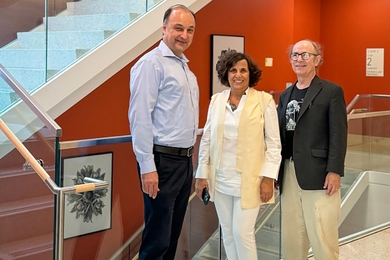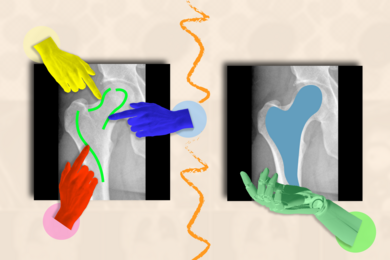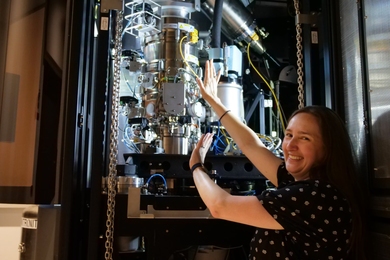Ronan McGovern, a postdoc in MIT’s Department of Mechanical Engineering, has been working on an innovative way to import beer. His approach allows foreign beer to reach our shores fresher than ever before, something that could forever change how beer is shipped.
Specifically: Rather than shipping beer in bottles, as is typically done, McGovern has created a system that allows beer to be transported in chilled casks at 20 percent alcohol by volume, slowing oxidation and microbial growth.
The secret of the approach, according to McGovern, is a special type of filtration that allows a portion of water to be removed from a beer, while retaining the flavor, aroma, alcohol, and source-water minerals that are critical to the beer’s flavor. It is an approach with the potential to improve the quality of imported beers and reduce the fuel required for transport.
With the assistance of MIT’s Translational Fellows Program (TFP), McGovern has been able to focus on another aspect of developing his technology: the commercial side.
“This has been the perfect avenue to allow me to spend time on the business aspects,” says McGovern, the president of Sandymount Technologies.
The program provides funding for postdocs to work one day a week for a year, allowing them to focus on bringing to market technologies that originated from their research at MIT. This is the third year of the program, which was created by Yoel Fink, the director of MIT’s Research Laboratory of Electronics (RLE). Initially launched as a seed program in 2013 with five postdocs, the program grew to a pilot of 16 in 2014. The 2015-16 program will be open campus-wide, and is aiming to increase to 50 fellows with support from the MIT Innovation Initiative and in close collaboration with the Venture Mentoring Service at MIT.
During the course of their program, the TFP postdocs engage in a series of activities aimed at building the commercial value of their venture and connecting with MIT’s rich entrepreneurial ecosystem. They identify and develop markets for their technology, build a team, create a business plan, and begin fundraising.
This year’s application deadline for the program is Sept. 30. In order to qualify a nomination letter from the supervisor of the postdoc is required.
Program fellows enjoy many benefits. McGovern, for for example, has spent significant time engaging with his potential customers, brewers, focusing on creating a business model. For him, the TFP was an attractive option because it allowed him to work on identifying the path to commercial value while continuing to work on his research.
“TFP provided flexibility for market-facing activities, which I could not normally engage in,” says McGovern, who has also worked with VMS and the Martin Trust Center to develop the business side of his project. “This wouldn’t be possible with any other program.”
Carlos Castro-Gonzalez, another TFP fellow who is also a Madrid–MIT M+Visión fellow, is spending his time on Leuko, a project that focuses on biomedical imaging, as he is working on creating a non-invasive device to measure the concentration of white blood cells. The device can provide a direct measurement of the strength of one’s immune system and in the future help personalize chemotherapy treatment for lymphoma patients.
For Castro-Gonzalez, one of the greatest benefits of the program was the mentoring he received. This guidance helped him secure two commercial grants, from the Coulter Foundation and the Center for Future Technologies in Cancer Care, focused on turning his research into a clinically-applicable product.
“The program helps connect us with MIT’s entrepreneurial ecosystem,” says Castro-Gonzalez, who has been involved in researching his topic for nearly two years. “That exposure has transformed my perspective on how to identify technical and commercial risks for my research, test business hypotheses, or interview potential clients. All these aspects now help inform how I set priorities for my venture.”
In another project, fellow Corey Fucetola studied how to transfer sub-micrometer thick substrates of patterned silicon from a carrier onto a receiving substrate with the goal of enabling ultra-high density integrated circuitry. He has developed a technique to detach these ultra-thin membranes from a carrier without tearing them, which addresses a fundamental limitation facing the semiconductor industry today.
“In the two years I have been a Translational Fellow, my team has grown from three to seven; we’ve identified our lead customer for whom we demonstrated technical feasibility; and we’ve since scaled up to four-inch wafer capability, none of which would have been possible without the support of the TFP,” Fucetola says.
More recently Fucetola and his team received a Deshpande Ignition grant and are in the process of productizing their technology. For Fucetola, the TFP is about more than enabling three-dimensional integrated circuits. “The program has helped us translate our research from fundamental science into a practical technology with substantial commercial opportunities,” he says.

